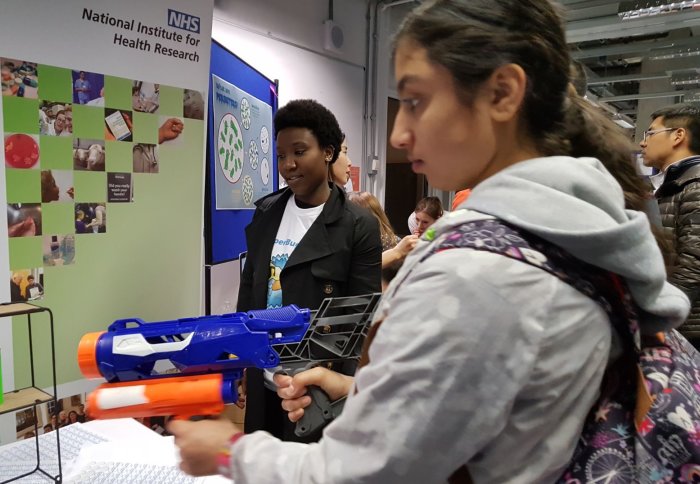Battling the bugs at Imperial Festival

Festival visitor blasting bacteria
The NIHR Health Protection Research Unit in Healthcare Associated Infections and Antimicrobial Resistance were out in full force at the Festival
The team from the NIHR HPRU in HCAI and AMR were in full force at the annual event for the fourth consecutive year showcasing its research and explaining AMR to the public, with six innovative stands within the Superbugs Zone, including two brand new interactive games – “Play your Cards Right” and “Battling the Bugs: the antibiotics arms race”. The group also used a new activity “Build a Bug” trialled at the Science Museum Late event earlier in the week, to illustrate all about natural antimicrobial resistance, selection pressure and acquired resistance.
 The weekend of intensive public engagement, kicked off for the team on Friday, when they participated for the first time in the schools-only event, which provides an opportunity for local pupils between the ages of 9 and 10, to visit some of the festival exhibits before fully open to the public. Children were invited to “Build a Bug” using pipe cleaners and pompoms. Having finished their creations, the “bacteria” were repeatedly “killed” by the treatment of antibiotics, until finally selection pressure resulted in the children choosing characteristics for their bug which conferred resistance. The resulting terrifying colony of multi-drug resistant organisms provided a very visual way to explain a complicated topic while hopefully reinforcing why antibiotics should only be taken when really needed. In the game Play Your Cards Right pupils selected answer cards to questions relating to antibiotic resistance and drug resistant infection, and as in in the TV game show were encouraged to shout “higher” or “lower” until they felt that had achieved the correct answer. This game brought home to the Primary school children how widespread antibiotic resistance really is and what part they can play in combatting it.
The weekend of intensive public engagement, kicked off for the team on Friday, when they participated for the first time in the schools-only event, which provides an opportunity for local pupils between the ages of 9 and 10, to visit some of the festival exhibits before fully open to the public. Children were invited to “Build a Bug” using pipe cleaners and pompoms. Having finished their creations, the “bacteria” were repeatedly “killed” by the treatment of antibiotics, until finally selection pressure resulted in the children choosing characteristics for their bug which conferred resistance. The resulting terrifying colony of multi-drug resistant organisms provided a very visual way to explain a complicated topic while hopefully reinforcing why antibiotics should only be taken when really needed. In the game Play Your Cards Right pupils selected answer cards to questions relating to antibiotic resistance and drug resistant infection, and as in in the TV game show were encouraged to shout “higher” or “lower” until they felt that had achieved the correct answer. This game brought home to the Primary school children how widespread antibiotic resistance really is and what part they can play in combatting it.
The Festival weekend itself saw both of these games in full swing again, co-hosted by our colleagues from the HPRU in Respiratory Infections. with “Dicing with Death” – our popular antibiotic resistance Snakes and Ladders game and “How Clean are Your Hands” reprised from last year- the latter with the addition of a dark-room wigwam which was a great hit with the younger generation as well as providing lower-light conditions for the detection any lingering pretend bacteria (glo-gel) on visitors’ hands!
HPRU’s newest game “Battling the Bugs: the antibiotics arms race” demonstrated how effective or not so effective antibiotics are in the battle against bacteria. Visitors relished blasting the bugs with nerf gun ‘penicillin’ pellets and were able to upgrade their arsenal with alternative antibiotics to fight the ever resistant superbugs. This game proved to be immensely popular with all ages and explained, in a fun and engaging way, the very real threat of a world in which antibiotics no longer work.

The last stand “Optimising Antibiotic Dosing using new biosensor technology” showcased technology developed in collaboration with our friends in the departments of Engineering and Chemistry. The phlebotomy arms, on show to illustrate how current antibiotic drug-levels are currently taken, proved a particular fascination for our younger visitors who had an opportunity to “take blood” as the first step required for undertaking current therapeutic drug monitoring. Members of the research team also took the opportunity to quiz visitors about how they felt about the prospect of a non-invasive microchip biosensor alternative which would dispense with the need to give blood samples. Unsurprisingly most responded positively at the option which didn’t require needles!!
Finally, the hard work of the team was also present outside of the superbugs zone as “Mrs X” a short play written by Nichola Baldwin as part of a collaboration with Theatre of Debate, was given a public read through at the Festival as part of the “performances and arts” programme. The play explored death, hope and fear , knowledge and confusion set both in 1918 with Dr Alexander Fleming and in the current day with a Dr Eleanor Grant working on antibiotic resistance in a London Hospital. The post-read through audience discussion elicited a number of great questions from young potential scientists in the audience and provided important food for thought.
Article text (excluding photos or graphics) © Imperial College London.
Photos and graphics subject to third party copyright used with permission or © Imperial College London.
Reporter
Rakhee Parmar
Department of Infectious Disease